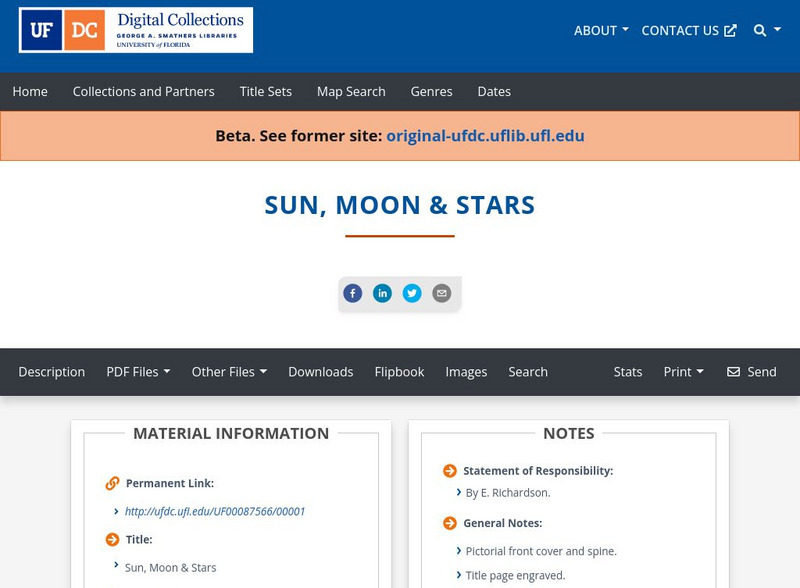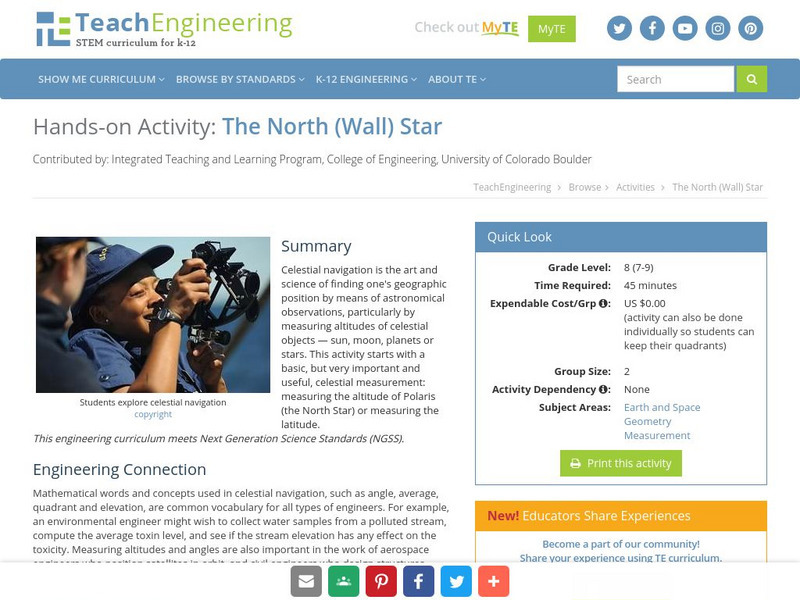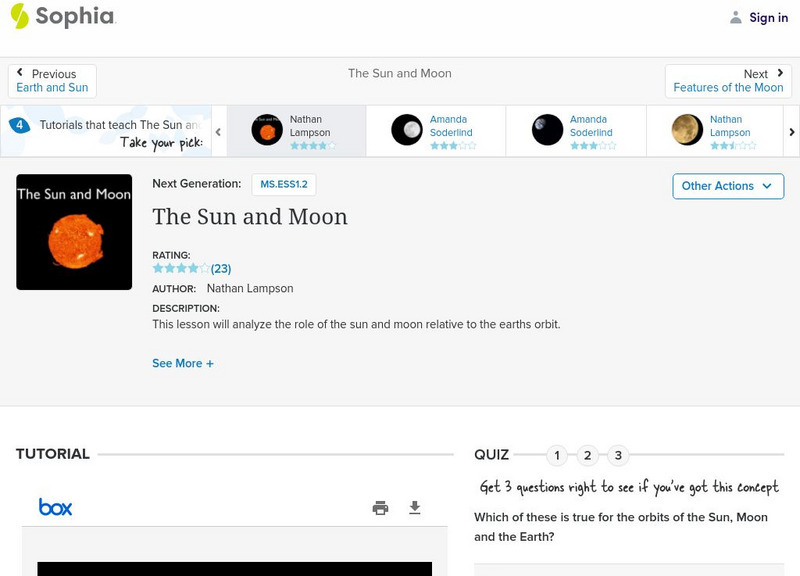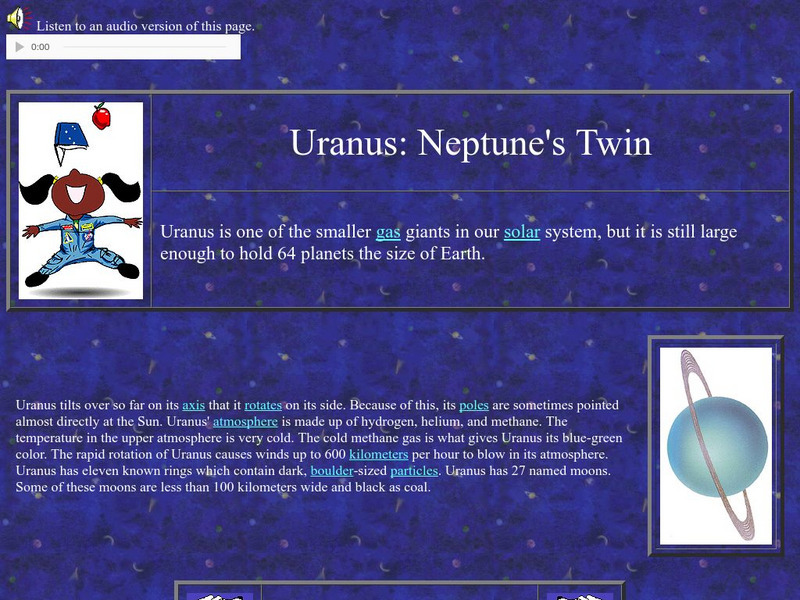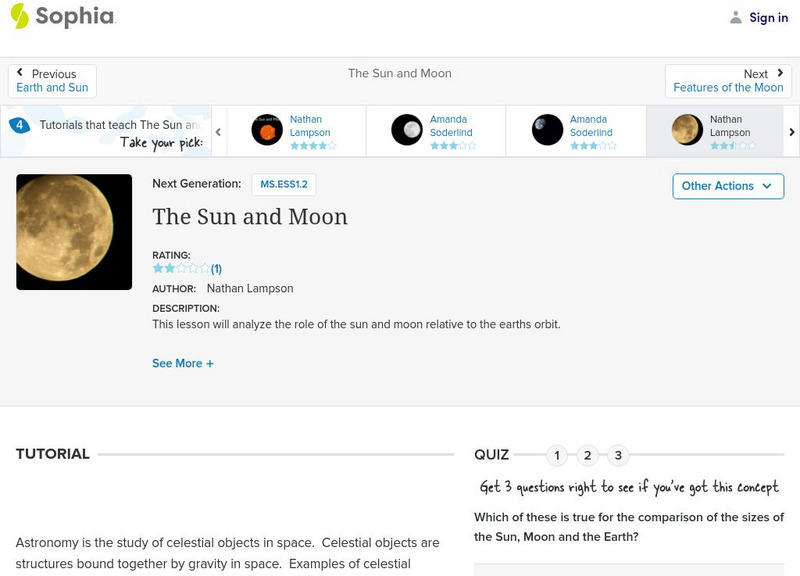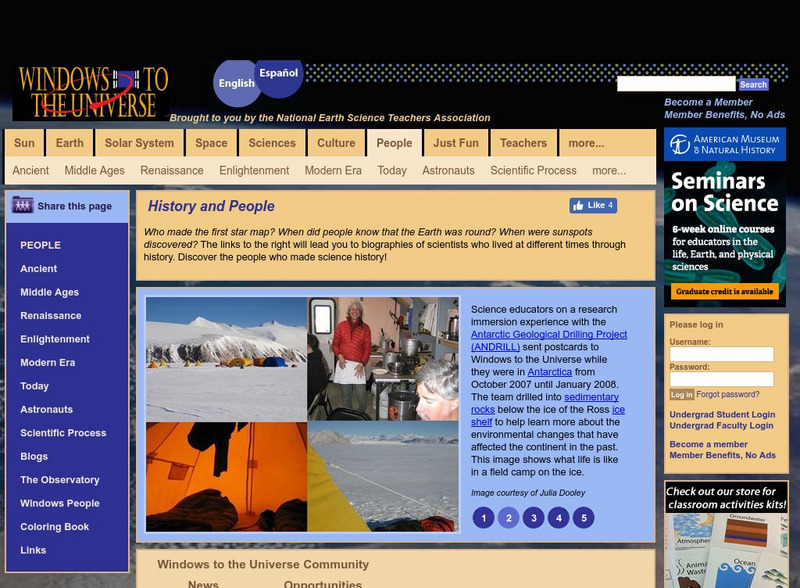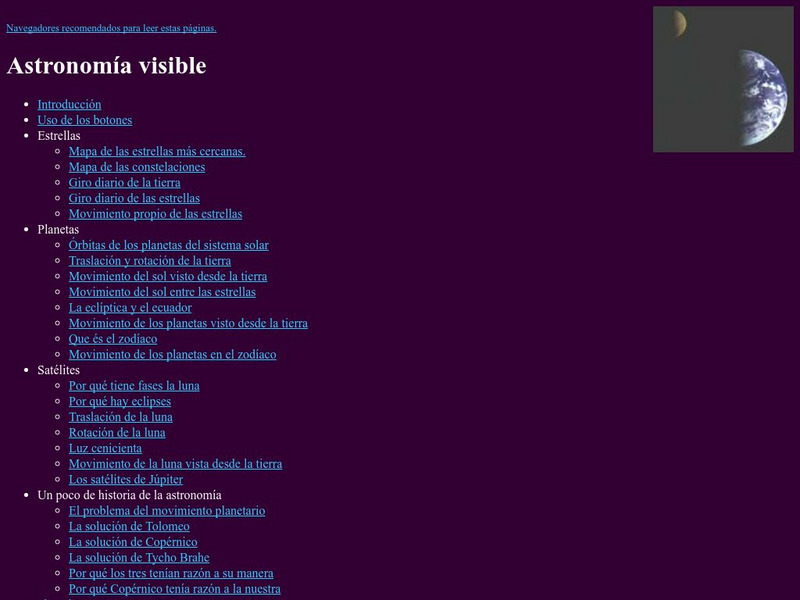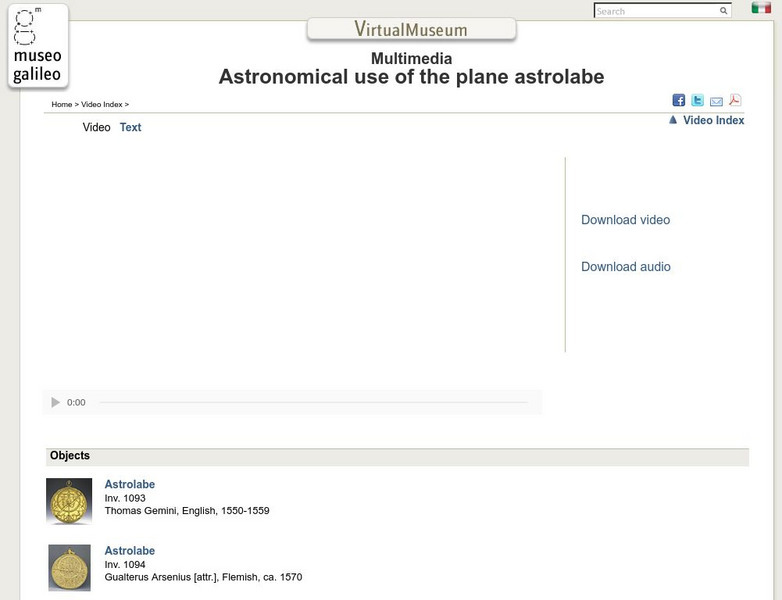Hi, what do you want to do?
University of Florida
Baldwin Library: Sun, Moon and Stars
A scanned copy of the 1899 publication of Sun, Moon and Stars by E. Richardson, a book of children's poetry.
PBS
Pbs Learning Media: Changes in the Sky: Interactive Lesson
Explore real-life and animated views illustrating the daily patterns of motion of the Sun, Moon, and stars in the sky. Students engage with a variety of media such as an interactive storybook, time-lapse videos, and images to identify...
PBS
Pbs Learning Media: Space: Bringing the Universe to the Classroom: Collection
Learn to identify and predict daily patterns of motion of the Sun, Moon, and stars across the sky with various media, including an interactive storyboard featuring the beloved characters from PEEP and the Big Wide World. For a printable...
Utah Education Network
Uen: How Big Are Earth, Sun, and Moon?
Understand where the sun is in the solar system and how big the earth, moon, and sun are.
Crayola
Crayola: Celestial Characters (Lesson Plan)
A fun lesson plan incorporating language arts, science, and art. Students read myths and legends about the sun, moon, or stars, then create a sculpture, and write their own story about it. Also provides adaptations and a list of...
Enchanted Learning
Enchanted Learning: Zoom Astronomy: All About Space
A fantastic collection of information about the solar system. Includes information on all of the planets, the moon, the sun, asteroids, comets, meteoroids, and stars. Also find puzzles, a dictionary, quizzes, classroom activities, and...
Better Lesson
Better Lesson: Our Stars
In this lesson, learners will observe and communicate how the stars are in the sky both day and night. The extremely detailed lesson includes photos and videos of the lesson in actions, examples of student's work, materials, parent...
TeachEngineering
Teach Engineering: The North (Wall) Star
Celestial navigation is the art and science of finding one's geographic position by means of astronomical observations, particularly by measuring altitudes of celestial objects - sun, moon, planets or stars. This activity starts with a...
CK-12 Foundation
Ck 12: First Grade Science: Sky Patterns
[Free Registration/Login may be required to access all resource tools.] Describes patterns that can be found in the movement of the Sun, Moon, and stars.
Sophia Learning
Sophia: The Sun and Moon
An expertly illustrated presentation which highlights the sun and moon, and their relationship to the Earth.
Better Lesson
Better Lesson: Our Sky
What objects are in the day sky and the night sky? How do they seem to move? Come and explore with us as we discover the sun, moon, planets and stars! This detailed lesson plan includes pictures and videos of the instructional activity...
Utah Education Network
Uen: The Night Sky
Learn about the rotation of the earth, the movement of the moon, and the position of the sun.
NASA
Nasa Star Child: Uranus, Neptune's Twin (Level 1)
Get to know the twin of Neptune with this introduction to Uranus. Listen to the information in an audio file. Features include a printable version of the page, and vocabulary words are linked to a glossary of terms.
NASA
Nasa Star Child: Star Child
StarChild from NASA defines and describes the Solar System in a simple and easy-to-understand manner. The website is broken down into two versions for the student, grade school and junior high.
Other
Sea and Sky: A Tour of the Solar System
Take a virtual tour of the solar system starting with detailed information about the sun.
Ministerio de Educación (Spain)
Observaciones Y Modelos en Astronomia
How does the length of the day change? How does the height of the sun change? Do we always see the same star? The answer to these questions and different observations about the sun, the moon and the stars that we can do from earth can be...
Sophia Learning
Sophia: The Sun and Moon: Lesson 3
This lesson will analyze the role of the sun and moon relative to the earth's orbit. It is 3 of 4 in the series titled "The Sun and Moon."
Sophia Learning
Sophia: The Sun and Moon: Lesson 4
This lesson will analyze the role of the sun and moon relative to the earth's orbit. It is 4 of 4 in the series titled "The Sun and Moon."
National Earth Science Teachers Association
Windows to the Universe: History & People
Biographies of people throughout history who looked at the sky and wondered what was there. Links to a detailed description of the planets and interactive activities.
Ministerio de Educación (Spain)
Ministerio De Educacion: Astronomia Visible
This site has maps of the nearest stars and constellations. Earth and star daily rotation, proper motion of the stars and many other topics about the solar system are also shown.Read phonetically
Institute and Museum of the History of Science
Museo Galileo: Multimedia: Video: Astronomical Use of the Plane Astrolabe
Invented in ancient Egypt, the plane astrolabe is a tool used by astronomers and navigators to determine time and identifying positions of the Sun, Moon, stars, and planets. Read text or view the video to understand the details of its...
ClassFlow
Class Flow: Calendar
[Free Registration/Login Required] The history of our calendar is presented through the passage of time with complete cycles of seasons in ancient history providing a starting place. Complete cycles of seasons are discussed and the...
NC State University
Adventures of the Agronauts
Come along with the Agronauts and discover space in order to report back to Commander Spud Goodroot. Fun site provides all types of information about space science! Various missions include: 'What's In Our Sky?', 'The Root of the...
Ministerio de Educación (Spain)
Ministerio De Educacion: Astronomia Para Ninas Y Ninos
Learn basic astronomy and travel through space. After you finish the lessons you can take the evaluation to obtain the clues needed to play the fun space games.





